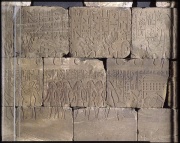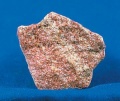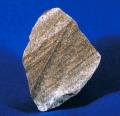Difference between revisions of "Sandstone"
m (Text replace - "== Authority ==" to "== Sources Checked for Data in Record ==") |
|||
| (3 intermediate revisions by 2 users not shown) | |||
| Line 1: | Line 1: | ||
| − | [[File:11.1533-SC39338.jpg|thumb|]] | + | [[File:11.1533-SC39338.jpg|thumb|Head of Tutankhamen: MFA# 11.1533]] |
== Description == | == Description == | ||
| − | A sedimental rock composed of sand grains ([ | + | A sedimental rock composed of sand grains ([[quartz|quartz]]) cemented together by other materials, such as [[silica|silica]], [[ferric%20oxide|iron oxide]], [[clay|clay]], or [[calcite|calcite]]. Sandstone varies widely in its hardness, color, and durability. The colors can be white, yellow, red, brown, or gray. Sandstones account for 10-20% of the Earth's sedimentary rock and form the backbone for some mountain ranges such as the Appalachians (Eastern U.S.), the Carpathians (eastern Europe), the Pennines (England), and the Apennines (Italy). Sandstones have been widely used for buildings, paving, grindstones, and whetstones. |
| − | [[File:54.648-CR8529-d1.jpg|thumb|]] | + | [[File:54.648-CR8529-d1.jpg|thumb|Sandstone blocks<br>MFA# 54.648]] |
== Synonyms and Related Terms == | == Synonyms and Related Terms == | ||
siltstone; graywacke; arkose; quartzite; brownstone; greensand; arenisca (Esp.) ;grès (Fr.); arenito (Port.); Sandstein (Deut.); zandsteen (Ned.) | siltstone; graywacke; arkose; quartzite; brownstone; greensand; arenisca (Esp.) ;grès (Fr.); arenito (Port.); Sandstein (Deut.); zandsteen (Ned.) | ||
| − | == | + | == Physical and Chemical Properties == |
| − | Size of sand grains = 0.06 - 2 millimeter | + | * Size of sand grains = 0.06 - 2 millimeter |
| − | + | * Density = 2.14-2.36 g/ml | |
| − | |||
| − | |||
| − | |||
| − | |||
| − | |||
== Comparisons == | == Comparisons == | ||
[[media:download_file_234.pdf|Properties of Common Abrasives]] | [[media:download_file_234.pdf|Properties of Common Abrasives]] | ||
| − | |||
| − | |||
== Additional Images == | == Additional Images == | ||
| Line 33: | Line 26: | ||
</gallery> | </gallery> | ||
| + | ==Resources and Citations== | ||
| − | + | * ''Encyclopedia Britannica'', http://www.britannica.com Comment: "sandstone" [Accessed January 22, 2002]. | |
| − | |||
| − | * ''Encyclopedia Britannica'', http://www.britannica.com Comment: "sandstone" | ||
* C.W.Chesterman, K.E.Lowe, ''Audubon Society Field Guide to North American Rocks and Minerals'', Alfred A. Knopf, New York, 1979 | * C.W.Chesterman, K.E.Lowe, ''Audubon Society Field Guide to North American Rocks and Minerals'', Alfred A. Knopf, New York, 1979 | ||
| Line 44: | Line 36: | ||
* ''Dictionary of Building Preservation'', Ward Bucher, ed., John Wiley & Sons, Inc., New York City, 1996 | * ''Dictionary of Building Preservation'', Ward Bucher, ed., John Wiley & Sons, Inc., New York City, 1996 | ||
| − | * | + | * Wikipedi: http://en.wikipedia.org/wiki/Sandstone (Accessed Nov. 9, 2005) |
* ''Van Nostrand's Scientific Encyclopedia'', Douglas M. Considine (ed.), Van Nostrand Reinhold, New York, 1976 | * ''Van Nostrand's Scientific Encyclopedia'', Douglas M. Considine (ed.), Van Nostrand Reinhold, New York, 1976 | ||
Latest revision as of 14:08, 13 June 2022
Description
A sedimental rock composed of sand grains (Quartz) cemented together by other materials, such as Silica, iron oxide, Clay, or Calcite. Sandstone varies widely in its hardness, color, and durability. The colors can be white, yellow, red, brown, or gray. Sandstones account for 10-20% of the Earth's sedimentary rock and form the backbone for some mountain ranges such as the Appalachians (Eastern U.S.), the Carpathians (eastern Europe), the Pennines (England), and the Apennines (Italy). Sandstones have been widely used for buildings, paving, grindstones, and whetstones.
Synonyms and Related Terms
siltstone; graywacke; arkose; quartzite; brownstone; greensand; arenisca (Esp.) ;grès (Fr.); arenito (Port.); Sandstein (Deut.); zandsteen (Ned.)
Physical and Chemical Properties
- Size of sand grains = 0.06 - 2 millimeter
- Density = 2.14-2.36 g/ml
Comparisons
Properties of Common Abrasives
Additional Images
Resources and Citations
- Encyclopedia Britannica, http://www.britannica.com Comment: "sandstone" [Accessed January 22, 2002].
- C.W.Chesterman, K.E.Lowe, Audubon Society Field Guide to North American Rocks and Minerals, Alfred A. Knopf, New York, 1979
- Ralph Mayer, A Dictionary of Art Terms and Techniques, Harper and Row Publishers, New York, 1969 (also 1945 printing)
- Dictionary of Building Preservation, Ward Bucher, ed., John Wiley & Sons, Inc., New York City, 1996
- Wikipedi: http://en.wikipedia.org/wiki/Sandstone (Accessed Nov. 9, 2005)
- Van Nostrand's Scientific Encyclopedia, Douglas M. Considine (ed.), Van Nostrand Reinhold, New York, 1976
- Random House, Webster's Encyclopedic Unabridged Dictionary of the English Language, Grammercy Book, New York, 1997
- The American Heritage Dictionary or Encarta, via Microsoft Bookshelf 98, Microsoft Corp., 1998
- G.S.Brady, Materials Handbook, McGraw-Hill Book Co., New York, 1971 Comment: p. 690
- Richard S. Lewis, Hawley's Condensed Chemical Dictionary, Van Nostrand Reinhold, New York, 10th ed., 1993
- CRC Handbook of Chemistry and Physics, Robert Weast (ed.), CRC Press, Boca Raton, Florida, v. 61, 1980 Comment: density=2.14-2.36
- Michael McCann, Artist Beware, Watson-Guptill Publications, New York City, 1979




